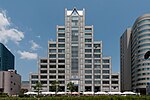Aoyama Gakuin

Aoyama Gakuin (学校法人青山学院, Gakkō Houjin Aoyama Gakuin) is an educational institute in Tokyo, Japan, which comprises Aoyama Gakuin University, Aoyama Gakuin Women's Junior College, Aoyama Gakuin Senior High School, Aoyama Gakuin Junior High School, Aoyama Gakuin Elementary School, and Aoyama Gakuin Kindergarten. The institute was founded in 1874 by Dora E. Schoonmaker, an American missionary sent to Japan by the Women's Foreign Missionary Society of the Methodist Episcopal Church. Canadian missionary Davidson Macdonald MD played a role in the establishment of Aoyama Gakuin, and his contribution to the improvement of Japan's educational system is considered an important episode in the early history of Japanese-Canadian relations.
Excerpt from the Wikipedia article Aoyama Gakuin (License: CC BY-SA 3.0, Authors, Images).Aoyama Gakuin
八幡通り, Shibuya
Geographical coordinates (GPS) Address Nearby Places Show on map
Geographical coordinates (GPS)
| Latitude | Longitude |
|---|---|
| N 35.661111111111 ° | E 139.71055555556 ° |
Address
青山学院大学
八幡通り
150-8366 Shibuya
Japan
Open on Google Maps








